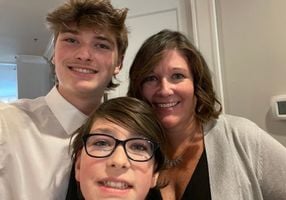If you’re like many parents of two-year-olds, you may be thinking about preschool for your child in the near future. Here’s the good news: research has shown that preschool helps provide a firm foundation in social and academic learning that benefits children as they move into elementary school and beyond.
But with all of the options to choose from, how do you know which program is best for you? And once you’ve made the decision to enroll your child, how should you prepare for that big first day of school?
Preschool Perks
The benefits of preschool are well-documented. Preschool gives young children an opportunity to gain a sense of independence, experience a structured setting, develop fine motor and gross motor skills, explore the larger world around them, and strengthen their cognitive abilities.
But beyond that, preschool is about socialization. “It’s never too early to socialize your child,” notes Kim Prann, a preschool teacher at Goshen Friends School. “Preschool is an opportunity for children to learn how to negotiate, communicate, and participate with other children and adults without the help of a parent. By taking turns, listening, and cooperating, preschoolers are learning to be part of a group, which sets them up for success as they enter kindergarten and grade school.”
Preschool also helps children gain a sense of security and confidence. “Young children need to know that there are other trustworthy adults that they can rely on, and preschool is a safe environment for them to do so,” continues Prann. Through interactions with adults and children who are not part of their immediate families, children learn how to problem-solve, too, which increases their sense of self-worth.
Assessing a Preschool Program
If you’ve decided that preschool would be a great next step for your child, how should you assess the variety of programs available in your community?
The National Association for the Education of Young Children has identified 10 program standards of a high-quality preschool program, including:
- A warm, welcoming, communal environment
- A curriculum that promotes social, emotional, physical, language, and cognitive development
- Individualized and small-group instruction
- Ongoing communication between parents and teachers about student progress
- A variety of age-appropriate materials and equipment
- Time for outdoor play
- Ability to engage in meaningful real-world activities (helping to take attendance or serve a snack, for example)
When you tour a potential preschool for your child, take note: Do the classrooms feature stations with blocks, dress-up clothes, puzzles, books, and art materials? Is there ample space and time for children to enjoy outdoor play? At this age, children learn by moving and doing, so kids should be “busy” and engaged throughout the day in a variety of activities.
At Goshen Friends School, our curriculum is based on the philosophy that children learn through dynamic play. Classrooms are set up with mini “exploration centers” where children can spend time building, painting, and pretending. Our 10-acre campus provides a backdrop for daily recess and our preschool outdoor education program. Children learn the value of routine, which is essential in preparing them for the transition to more structured kindergarten experience, but they also have ample opportunities to create and explore—and, in doing so, learn.
Preparing Your Child for Preschool
You’ve done your homework and enrolled your child in the perfect preschool program. Congratulations! Now comes the hard part.
Parents’ number one fear when sending their children off to preschool is separation anxiety. No one wants to think of their child being unhappy at school! Experts recommend several tactics to help children (and, let’s face it, you) make a smooth transition:
- Do some trial mini-separations and playdates the months before school begins. Start small, perhaps an hour or two, and work up to longer periods of time.
- Practice getting ready—waking up, getting dressed, having breakfast, and getting out the door—so the first day of school isn’t so chaotic.
- Seek out other children who will be in the classroom ahead of time for socialization opportunities. Your children will get to know one another, and you’ll meet fellow parents, too!
- Along those lines, check to see if your school offers a summer camp, where children can meet teachers and fellow students and get familiar with the school environment before fall. Goshen Friends’ Summer Camp provides opportunities for students to get their feet wet and socialize in a carefree setting before the school year begins.
- Let your child pick out his or her “first day of school” outfit and school supplies, if needed. Doing so will make the occasion special.
- On the first day, keep it short and sweet at dropoff. Breathe deeply, and trust your teachers. Some schools, like Goshen Friends, use a carline to help with the “long goodbye.” Having students walk into the classroom with their teacher also increases their sense of autonomy. They can do it—and so can you!
Preparation and a positive attitude will ensure that your family’s transition to the preschool years will go off without a hitch. Have more questions about preschool and what you and your child should expect? Goshen Friends is happy to help! Call us at (610) 696-8183, or stop by for a tour. We’d love to meet you.
Goshen Friends School is an independent Quaker preschool and pre-kindergarten located in West Chester, PA. Guided by the Quaker values of simplicity, peace, integrity, community, and stewardship, Goshen Friends is dedicated to empowering young learners by giving them opportunities to explore and grow in challenging yet supportive ways. Learn more on our school website, and follow along on Facebook, Twitter, and Instagram!


